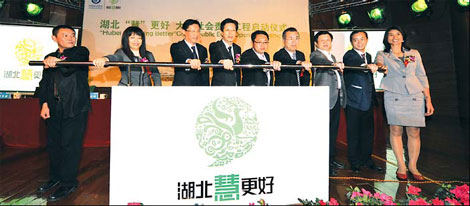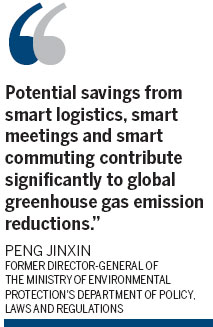|
|

Hubei government leaders and company representatives were present for the opening ceremony of a low-carbon smart city initiative in the province. Photos provided to China Daily
|
When the China Mobile Hubei Company recently called on other companies and the public sector to work together on a low-carbon smart city initiative, to turn Hubei province into a "low-carbon area" a dozen companies applauded the idea.
Guo Yonghong, chairman of China Mobile Hubei, brought up the idea at a forum in Wuhan, capital of Hubei province, last week, where he proposed tougher energy-efficiency standards for equipment procurement.
The National Development and Reform Commission selected Hubei, earlier this year, as one of the first group of bases in the country for low-carbon pilot tests.
It did not seem to be an easy job. The province is famous for its traditional concentration of heavy industries and scant regard for the environment, but, emerging telecom developments seem to paint a much more hopeful picture.
In fact, the telecommuting sector has the greatest potential for carbon emission reductions in China, and could save 340 million tons of CO2 emissions in 2020, Guo told the audience of environmental experts, local government officials and company representatives.
In the long run, he said, savings from virtual meetings will increase at a much greater rate - about 623 million tons of CO2 annually - by 2030, thereby cutting commercial aviation emissions by nearly 40 percent,
A joint World Wildlife Fund (WWF) China and China Mobile study published earlier this year shows that China's telecommunications sector cut 48.5 million tons of carbon dioxide emissions in 2008 and 58.2 million tons in 2009 thanks to low carbon solutions. These include telecommuting, electronic data interfaces and more efficient logistics, explained Lei Hongpeng, senior program officer of WWF China.
The study indicates that the savings nearly match the total 2008 emissions of countries like Sweden, Denmark or Finland, individually.
The study looked at direct savings from 14 of China Mobile's low-carbon information communication technologies (ICTs). These include smart logistics (matching truck deliveries to loads), dematerialization (saving paper and other materials), smart work (smart meetings, and reducing commuting and travel needs) and smart appliances (remotely monitored and controlled for energy savings).

The potential reduction from dematerialization, smart logistics, and smart work amounts to 399 million tons in 2010, 615 million tons in 2020, and 1,298 million tons in 2030.
"China can lead the way to a low-carbon economy," Peng Jinxin, former director-general of the Ministry of Environmental Protection's department of policy, laws and regulations, said.
"The potential savings from smart logistics, smart meetings and smart commuting contribute significantly to global greenhouse gas emission reductions and to China's target of reducing the carbon intensity of its economy by 40 to 45 percent by the year 2020."
Zhang Zhiqiang, executive president of Nokia-Siemens Networks, China, explained further that, "Many telecom solutions are transformative and help people get better service with dramatically reduced emissions.
"It is important to pay attention to the companies that deliver the solutions society needs, and not only focus on those that are big emitters."
Ren Shimao, vice-chairman of the provincial NPC standing committee, said, "We are happy to see Hubei Mobile present this initiative that clearly demonstrates the important role of the mobile telecom sector in helping Hubei move toward a low carbon economy.
"All the signs are that once a new deal is in place, private enterprise and government will have the mandate they need to accelerate this urgent shift to a low-carbon economy."
China Daily
(China Daily 11/09/2010 page15)
|